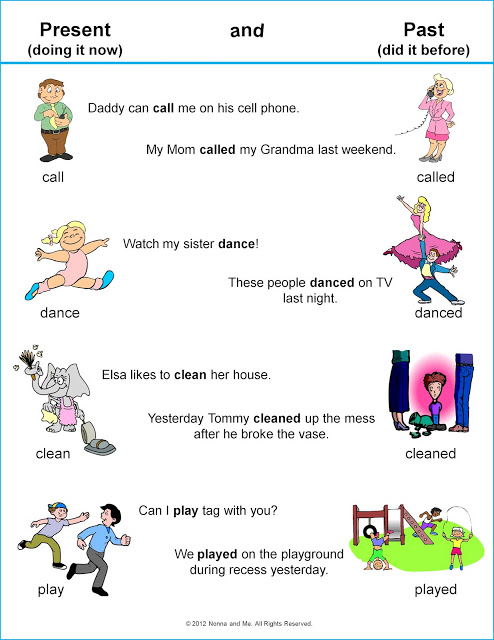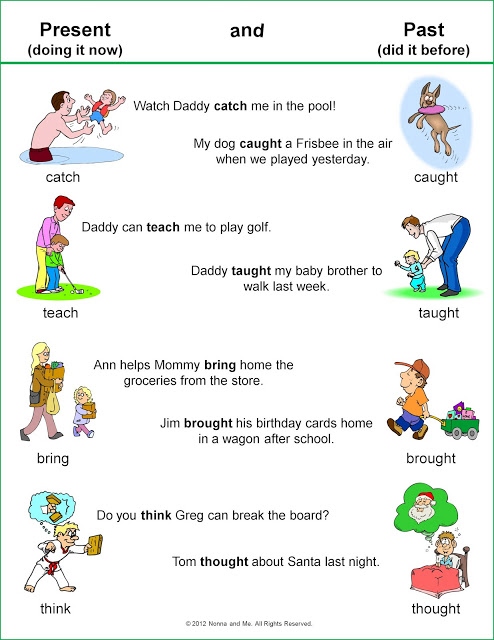It's Verb Time!
Page 1 of 1
 It's Verb Time!
It's Verb Time!
When teaching verbs to preschoolers it's a good idea to first talk about what a verb is. Keep it simple. A verb is an action word that describes something we do... we eat, we sleep, we run, we play, we sing.
Then you can break down verbs into two categories or tenses: present and past. Again, keep it simple. Present tense verbs are used when we are doing something now. "Today I dance". Past tense verbs are used when we talk about something we did before. "Yesterday I danced".
- REGULAR VERBS:
Start with this first Activity Sheet that demonstrates how some present tense verbs become past tense verbs by simply adding 'ed' to the end of the word.
Here is a list of additional regular verbs that you can use to demonstrate the 'ed' rule:
work learn turn watch open walk talk beep splash
http://nonnaandme.blogspot.com/2012_04_01_archive.html
Then you can break down verbs into two categories or tenses: present and past. Again, keep it simple. Present tense verbs are used when we are doing something now. "Today I dance". Past tense verbs are used when we talk about something we did before. "Yesterday I danced".
- REGULAR VERBS:
Start with this first Activity Sheet that demonstrates how some present tense verbs become past tense verbs by simply adding 'ed' to the end of the word.
Here is a list of additional regular verbs that you can use to demonstrate the 'ed' rule:
work learn turn watch open walk talk beep splash
http://nonnaandme.blogspot.com/2012_04_01_archive.html

Vincent Law- Advanced Fluency

- Posts : 1537
Join date : 2011-12-22
Age : 49
Location : Philadelphia
 Re: It's Verb Time!
Re: It's Verb Time!
- IRREGULAR VERBS:
How many times have you heard your preschooler use the words 'catched' or 'teached' or 'thinked'? (I hear it a lot with my 5-year old granddaughter). So let's introduce these kids to the world of irregular verbs. Explain that some verbs, or action words, change a lot when you use them to talk about something that happened before. Use the Activity Sheet below to demonstrate.
Here is a list of additional irregular verbs that you can talk about:
break / broke fight / fought buy / bought go / went eat / ate sing / sang
swim / swam sting / stung hear / heard draw / drew see / saw
I've found that a good way to teach my granddaughter correct English is through simple conversation. When she makes a mistake while we're chatting, I just repeat what she has said using the correct word. Example: "Nonna, my Mommy 'teached' me to dance." My Response: "Mommy 'taught' you to dance! That's wonderful."
I think children develop an 'ear' for what sounds right and what sounds wrong. So if we get it right, eventually they will too.
How many times have you heard your preschooler use the words 'catched' or 'teached' or 'thinked'? (I hear it a lot with my 5-year old granddaughter). So let's introduce these kids to the world of irregular verbs. Explain that some verbs, or action words, change a lot when you use them to talk about something that happened before. Use the Activity Sheet below to demonstrate.
Here is a list of additional irregular verbs that you can talk about:
break / broke fight / fought buy / bought go / went eat / ate sing / sang
swim / swam sting / stung hear / heard draw / drew see / saw
I've found that a good way to teach my granddaughter correct English is through simple conversation. When she makes a mistake while we're chatting, I just repeat what she has said using the correct word. Example: "Nonna, my Mommy 'teached' me to dance." My Response: "Mommy 'taught' you to dance! That's wonderful."
I think children develop an 'ear' for what sounds right and what sounds wrong. So if we get it right, eventually they will too.

Vincent Law- Advanced Fluency

- Posts : 1537
Join date : 2011-12-22
Age : 49
Location : Philadelphia
 Similar topics
Similar topics» The Action Verb
» Verb 'To Have (got) - Present
» Subject / Verb disagreement
» VERBS - Verb Classification
» GRAMMAR - Subject-Verb Agreement
» Verb 'To Have (got) - Present
» Subject / Verb disagreement
» VERBS - Verb Classification
» GRAMMAR - Subject-Verb Agreement
Page 1 of 1
Permissions in this forum:
You cannot reply to topics in this forum|
|
|



